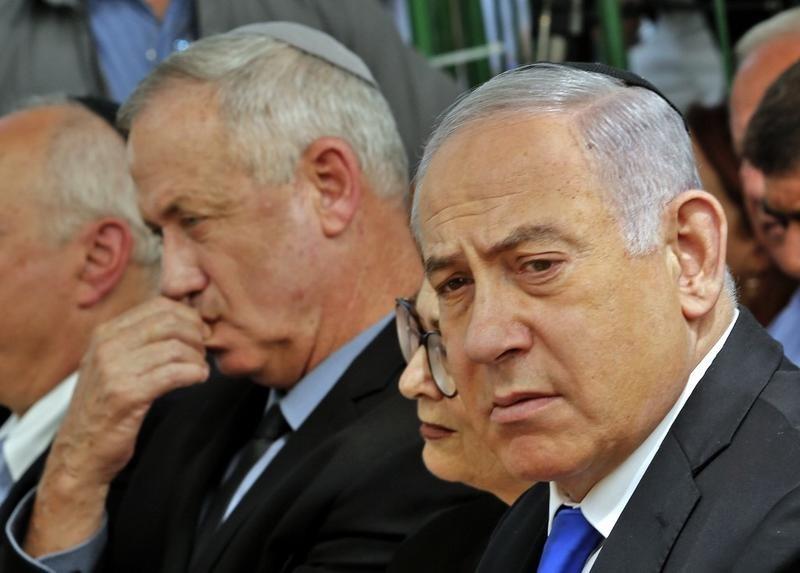
This file photo taken on Sept 19, 2019 shows Israeli Prime Minister Benjamin Netanyahu (right) and Benny Gantz, leader of Blue and White party, attend a memorial ceremony for late Israeli president Shimon Peres, at Mount Herzl in Jerusalem. (GIL COHEN-MAGEN / AFP)
JERUSALEM — As Israel is heading to an unprecedented third election within a year on March 2, polls indicate that a fourth election in a few months seems increasingly realistic.
The two main opponents are Prime Minister Benjamin Netanyahu, leader of the right-wing Likud party, and Benny Gantz, leader of the centrist Blue and White party.
Polls are showing no major change in the breakdown of power between the two blocs
Netanyahu is facing charges of corruption, fraud and breach of trust, but he has denied any wrongdoing. His trial is scheduled to begin two weeks after the election. Gantz remains steadfast in his refusal to sit in a coalition with an indicted leader.
Polls are showing no major change in the breakdown of power between the two blocs, and it looks like that there is no one acquiring the 61 seats needed to rule Israel's government. The 120-seat Israeli parliament, or Knesset, appears to remain fragmented beyond repair.
"It's difficult for me to see any real chance for a surprise of substantive change in the large picture ... Unfortunately, the most likely scenario is another election," said Assaf Shapira, researcher at the Israeli Democracy Institute.
Gantz has also said that he will not form a government with the Arab parties. With the two large parties currently tied, neither is capable of garnering a majority and the path to a fourth election seems clear.
Although there was an attempt to replace him within the party ahead of these elections, Netanyahu won the internal vote in the Likud.
His loyal supporters believe that he is innocent and since Israeli law does not bar him from remaining in power, they think that Netanyahu has the right to do so.
 Likud party supporters wave a flag bearing the image of Israeli Prime Minister Benjamin Netanyahu during an election rally in the central Israeli city of Lod on Feb 11, 2020. (MENAHEM KAHANA / AFP)
Likud party supporters wave a flag bearing the image of Israeli Prime Minister Benjamin Netanyahu during an election rally in the central Israeli city of Lod on Feb 11, 2020. (MENAHEM KAHANA / AFP)
However, his opponents believe that his morals are crooked and he is holding on to his seat only to improve his legal position. If Netanyahu leads the next government, he could promote a law that exempts a sitting prime minister from being prosecuted during his term.
"I do think this is Netanyahu's last election but since he is probably the most experienced politician in Israel's history ... one can never count him out," said Jonathan Rynhold, professor from the political science department at the Bar Ilan University.
"If there is even one chink of light, which gives him some kind of opportunity, he will take advantage of it," the professor added.
Israel has been under an interim government for over a year now. There is no updated budget and long-term projects are at a standstill. While most Israelis are not yet feeling the impact of the political impasse, the longer it persists, the more effects the country will suffer.
"This is an acute crisis of the Israeli political system and ... maybe the most acute crisis in the history of the country," Shapira told Xinhua.
The looming and realistic threat of a fourth election may be enough to motivate politicians to budge from their steadfast positions and compromise and form a government.
This depends largely on the Israeli kingmaker in the political arena, Avigdor Lieberman, head of the leader of the right-wing Israel Our Home party.
Lieberman was once a member of the right-wing bloc and made a surprise appearance in the last two elections, saying that he refuses to sit with Orthodox Jewish parties who are in a solid pact with Netanyahu.
A few days ago, Lieberman explicitly stated that Netanyahu "could no longer lead." Since polling shows that his party will win between 7-10 mandates, neither Gantz or Netanyahu can gain the majority without Lieberman.
ALSO READ: Third Israeli election looks to prolong political stalemate
While the main issue of the current campaign remains Netanyahu's capability to continue governing, and it is the voters' turnout which will have a critical impact on the results.
Still, there is a concern that Israelis are tired of heading to the polls and might express their dismay by simply not showing up. In a race which is so tight, every vote counts.
"The public really doesn't want a fourth election and the politicians are aware of that and they do not want to be blamed for it," Rynhold told Xinhua.
READ MORE: Israel's left-wing parties merge ahead of March poll
"People are right when they think the deadlock will continue. Voters vote when they feel they can change the picture," said Shapira. "This increases voter fatigue and we will see a decline in voter turnout but not drastically."


